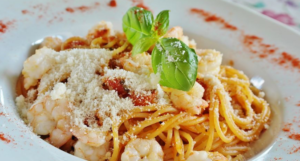A pasta industry more than 1500km from Italy thrives thanks to a unique partnership between farmers, researchers and a major food manufacturer. This collaboration is based in South Australia and has seen the nation’s No.1 dry pasta producer – San Remo – grow its range of 750 products and export to 35 countries.
Better quality durum wheat
 Almost no durum was grown in South Australia before the 1990s, but that has changed thanks to a collaboration between farmers, researchers and a pasta manufacturer. A nutty, high-protein variety called Yallaroi now thrives in the state’s harsh climate and is snapped up worldwide. That’s due to a lengthy research process, plant breeding, testing and continuous improvement.
Almost no durum was grown in South Australia before the 1990s, but that has changed thanks to a collaboration between farmers, researchers and a pasta manufacturer. A nutty, high-protein variety called Yallaroi now thrives in the state’s harsh climate and is snapped up worldwide. That’s due to a lengthy research process, plant breeding, testing and continuous improvement.
It takes about 8-12 years to get a new variety from a University of Adelaide research project to a commercial release. It’s worth it, though, as the premium buyers pay for quality durum can be higher than for bread wheat.
The quality of durum is determined by its colour (yellowness), protein and vitreous hardness – it must be very tough and have a nutty taste. It must also grow in suitable soil with a high water-holding capacity and a sandy texture. Clare is one of the best regions in the country for increasing it.
Durum is more vulnerable to biotic threats than common wheat and requires lengthier rotations to build up soil nitrogen. It is also more susceptible to drought and can be damaged by frosts. Managing the risks involved in growing it can be challenging for growers. But flat world prices and a steady demand for high-quality pasta SA are helping to make it an attractive alternative to other crops.
SADGA aims to promote and support the growth of durum wheat in Southern Australia through its activities, including growing pure durum seed and conducting industry research. It also performs forums and crosswalks to educate growers, agronomists and consultants on the benefits of planting durum.
The organisation recently conducted a gross margin sensitivity analysis to compare leading durum varieties with several leading bread wheat varieties. Results showed that at all yield/price combinations, durum had a greater return than bread wheat. The research compared genotypes from DBA’s Northern and Southern programs, plus a variety of GRDC varieties. The trials were conducted in rainfed and watered blocks at Narrabri, NSW. The best-performing types were Trojan, DBA Aurora and 101042. These genotypes are suitable for high-yielding irrigated production systems and can be planted on zero or minimum tillage.
Locally produced
South Australia has an enviable reputation for excellent food and wine. It is based on the state’s sacred landscape and climate, centuries of hard work and a willingness to innovate. With a focus on innovation and the recent establishment of a Food Innovation Centre to maximise future opportunities, the industry is well-positioned for growth in local and international markets.
The state government has made a massive commitment to the industry. It is working hard in areas beyond biosecurity management to ensure pasta SA products reach as many people as possible. A significant part of this is investing in research and development to improve the quality of South Australia’s produce and make it more competitive in global markets. It includes supporting the Waite Research Precinct in Adelaide, home to the South Australian Research and Development Institute (SARDI).
SARDI’s world-leading research in plant biotechnology, cereal breeding, sustainable agriculture, horticulture and wine and agribusiness is the basis for a robust local supply chain for grains, fruits, wines and other produce. It is also the key to developing and expanding export markets.
In addition to the world-class research SARDI conducts on behalf of the state’s producers, South Australia is fortunate to have an impressive network of farmers and small businesses dedicated to producing high-quality, locally-produced foods. It enables the local market to access fresh, locally-grown ingredients and avoid the need for expensive food miles.
For example, at Riverside Farm in the Barossa Valley, owner Richard and his family produce pastured eggs and wool and use a ‘zero waste’ approach to business. It means that eggs that are too big or too small for sale are used to make a range of artisan egg pasta. Duro Pasta uses their local, Australian durum wheat semolina alongside the wholesome, pastured Riverside Farm eggs and other seasonal produce to make delicious, hand-crafted Italian-style pasta spirals.